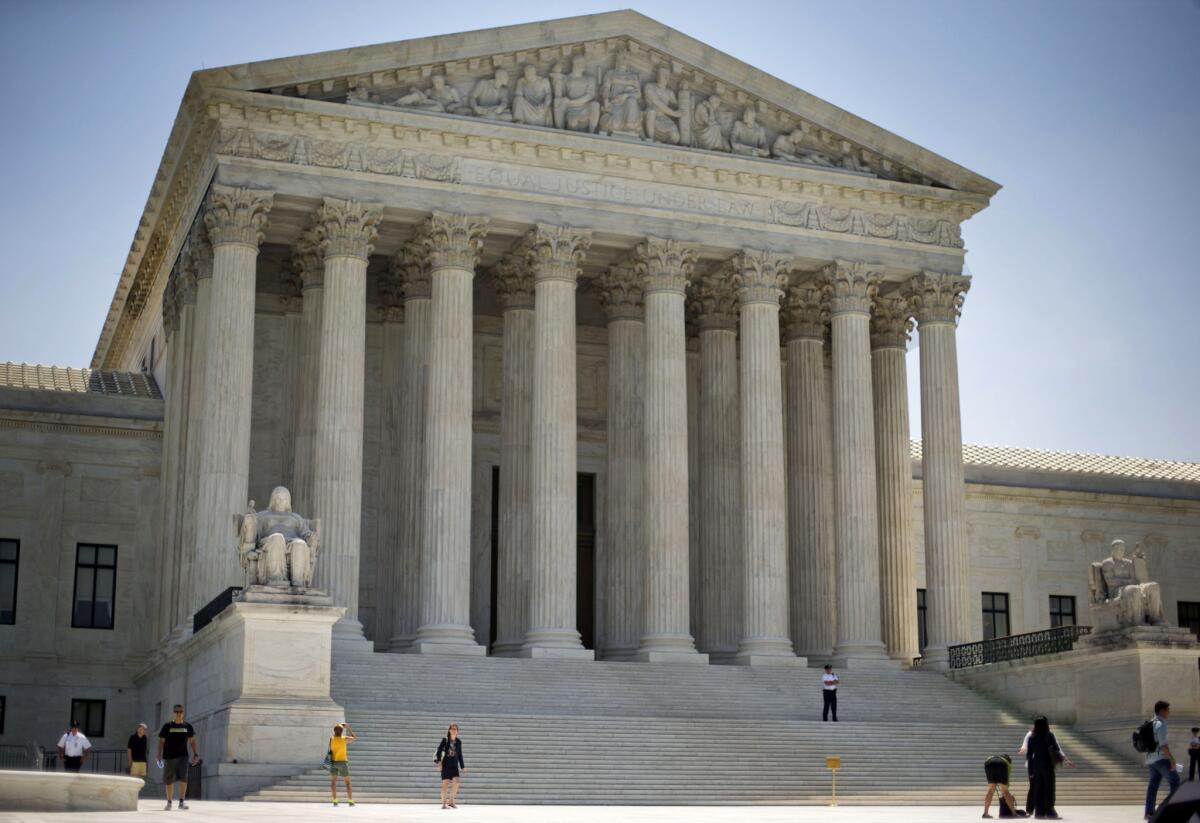Supreme Court upholds workers’ class-action verdict in setback for corporations

The Supreme Court building in Washington.
WASHINGTON — The Supreme Court dealt a setback to corporate America on Tuesday by upholding a nearly $6-million class-action verdict for a group of Iowa meat packers who contended they were not paid for time spent putting on and taking off safety gear.
The high court has been skeptical of class-action claims in recent years, and when the justices agreed to hear the appeal from Tyson Foods, corporate groups — including the U.S. Chamber of Commerce and the National Assn. of Manufacturers — had hoped the justices would use the case to further rein in class-action claims.
Instead, in a 6-2 ruling, the high court said the class-action claim made sense.
“This is excellent news for workers,” said Adam Klein, deputy managing partner of employment law firm Outten & Golden LLP, which represents employees.
In its appeal, Tyson had argued that the workers could not prove how much time they spent putting on their protective clothing, relying instead on estimates.
Since the company did not keep records, workers used an expert who studied a sample and concluded they spent on average about 18 minutes a day putting on safety gear.
That’s good enough, said Justice Anthony M. Kennedy. “A representative or statistical sample, like all evidence, is a means to establish or defend against liability,” he said.
Chief Justice John G. Roberts Jr. and Justices Ruth Bader Ginsburg, Stephen G. Breyer, Sonia Sotomayor and Elena Kagan agreed.
In dissent, Justices Clarence Thomas and Samuel A. Alito Jr. said the class-action claim should have been tossed out. “Our precedents generally prohibit plaintiffs from maintaining a class action when an important element of liability depends on facts that vary among individual class members,” Thomas said.
That was the finding five years ago, when the court tossed out a huge class-action suit alleging gender bias in salaries brought on behalf of 1.5 million women who worked for Wal-Mart. The justices said at the time that the women, who worked in stores across the nation, could not point to a common policy that led to lower wages. Statistics alone could not prove discrimination, the court said.
But in Tuesday’s decision, Kennedy said the Wal-Mart ruling “does not stand for the broad proposition that a representative sample is an impermissible means of establishing class-wide liability.”
Also, unlike with Wal-Mart, the Tyson workers were employed at the same pork-processing plant in Storm Lake, Iowa.
“In this case each employee worked in the same facility, did similar work and was paid under the same policy,” Kennedy said.
The ruling is especially significant for low-wage workers whose employers don’t keep track of their hours and often put the burden of proof on employees, said Catherine Ruckelshaus, general counsel and program director for the National Employment Law Project, which submitted an amicus brief for the case.
“The Supreme Court really clearly said workers, like the workers in this case, can use statistical evidence and representative evidence to determine the classwide liability because Tyson didn’t keep track of the time,” she said.
But Richard Alfred, partner at Seyfarth Shaw LLP and chair of the firm’s national wage and hour litigation practice, said the court’s opinion is narrow and will have a limited effect on employers’ defense of wage and hour class-action lawsuits.
Since Tyson did not contest the methodology used by the plaintiffs’ expert in determining the conclusions of the study, the court could only assume that the study was admissible and could be used by a jury to determine a class-wide recovery, he said.
“I think that employers will be more apt to challenge the experts’ methodologies and to contest the way the experts’ sampling was done and how the experts came up with his or her conclusions,” he said.
The outcome also differed from the court’s decision in 2014, when it rejected a class-action claim from workers at an Amazon warehouse who said they should be paid for the time spent waiting in line to pass through security screenings.
In the Amazon case, the justices said the time spent in security lines was not a “principal activity” of their job, and therefore was not covered by the federal law that workers claimed the company had violated.
In the Tyson case, both sides agreed that putting on protective gear was an “integral and indispensable” part of the hazardous work, Kennedy said.
Federal law requires employees to be paid overtime wages if they work more than 40 hours a week, and workers filed a class-action suit alleging Tyson did not pay for the extra hours. The jurors ruled in favor of the class of 3,344 workers and awarded back pay and damages totaling $5.8 million.
david.savage@latimes.com
samantha.masunaga@latimes.com
More to Read
Sign up for Essential California
The most important California stories and recommendations in your inbox every morning.
You may occasionally receive promotional content from the Los Angeles Times.











